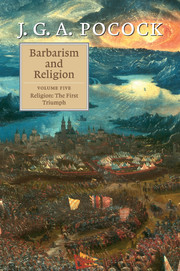Book contents
- Frontmatter
- Contents
- Preface
- Acknowledgements
- Advice to readers
- List of abbreviations
- Introduction
- PART I GIBBON'S ORTHODOX SOURCES
- PART II THE SOURCES OF PROTESTANT ENLIGHTENMENT
- PART III THE TWO CHAPTERS EXPLORED
- 7 The English setting
- 8 Gibbon's fifteenth chapter: the spread of Christianity and the rise of the clergy
- 9 The sixteenth chapter: intolerance, persecution and philosophy
- PART IV CONTROVERSY AND CONTINUATION
- Bibliography
- Index
9 - The sixteenth chapter: intolerance, persecution and philosophy
Published online by Cambridge University Press: 01 March 2011
- Frontmatter
- Contents
- Preface
- Acknowledgements
- Advice to readers
- List of abbreviations
- Introduction
- PART I GIBBON'S ORTHODOX SOURCES
- PART II THE SOURCES OF PROTESTANT ENLIGHTENMENT
- PART III THE TWO CHAPTERS EXPLORED
- 7 The English setting
- 8 Gibbon's fifteenth chapter: the spread of Christianity and the rise of the clergy
- 9 The sixteenth chapter: intolerance, persecution and philosophy
- PART IV CONTROVERSY AND CONTINUATION
- Bibliography
- Index
Summary
THE HISTORICAL ORIGINS OF TOLERATION AND INTOLERANCE
Gibbon opens his sixteenth chapter – on ‘the conduct of the Roman government towards the Christians, from the reign of Nero to that of Constantine’ – with language that recalls the problems posed by both ancient history and Hanoverian politics. ‘If we seriously consider’, he says
the purity of the Christian religion, the sanctity of its moral precepts, and the innocent as well as austere lives of the greater number of those who during the first ages embraced the faith of the Gospel –
language antiseptically emphasised in the previous chapter, as in most contemporary sermons and homilies –
we should naturally suppose that so benevolent a doctrine would have been received with due reverence even by the unbelieving world; that the learned and the polite, however they might deride the miracles, would have esteemed the virtues of the new sect;
miracles and their scoffing rejection defining Christian claims and ancient philosophy as each appeared to Gibbon, as well as a set of attitudes open to an eighteenth-century unbeliever;
and that the magistrates, instead of persecuting, would have protected an order of men who yielded the most passive obedience to the laws, though they declined the active cares of war and government.
The matter of the last clause has been discussed in chapter 15, and its statement here clearly sets limits to the extent to which Christian pacifism is to be seen as contributing to the decline and fall of the empire.
- Type
- Chapter
- Information
- Barbarism and Religion , pp. 289 - 310Publisher: Cambridge University PressPrint publication year: 2011



